2021-2022学年人教版英语七年级上册Unit 5 Do you have a soccer ball?复习课件(共32张PPT)
文档属性
| 名称 | 2021-2022学年人教版英语七年级上册Unit 5 Do you have a soccer ball?复习课件(共32张PPT) | 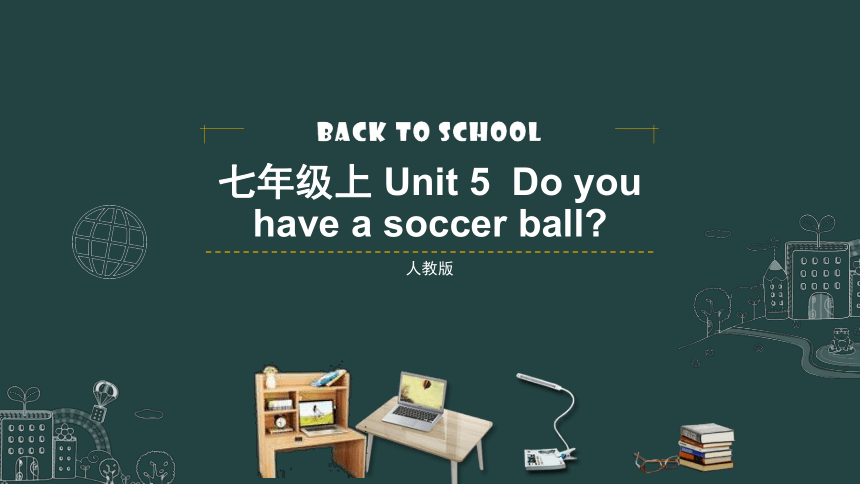 | |
| 格式 | zip | ||
| 文件大小 | 733.9KB | ||
| 资源类型 | 教案 | ||
| 版本资源 | 人教新目标(Go for it)版 | ||
| 科目 | 英语 | ||
| 更新时间 | 2021-10-13 16:42:32 | ||
图片预览



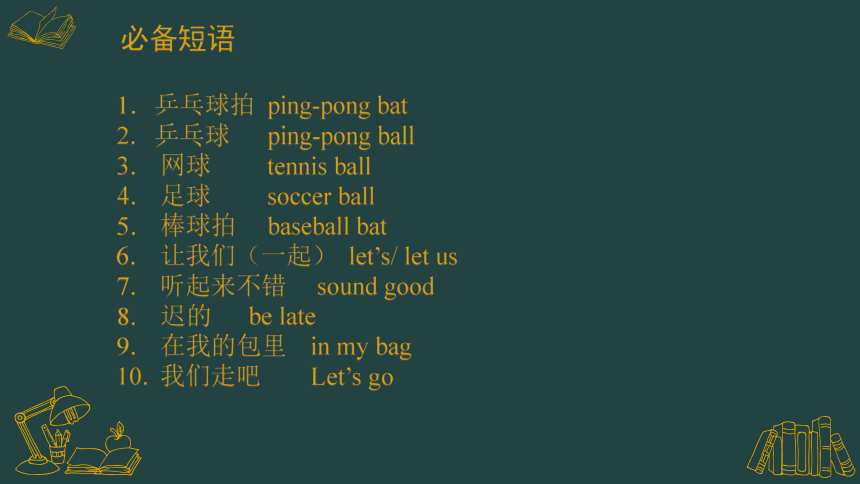
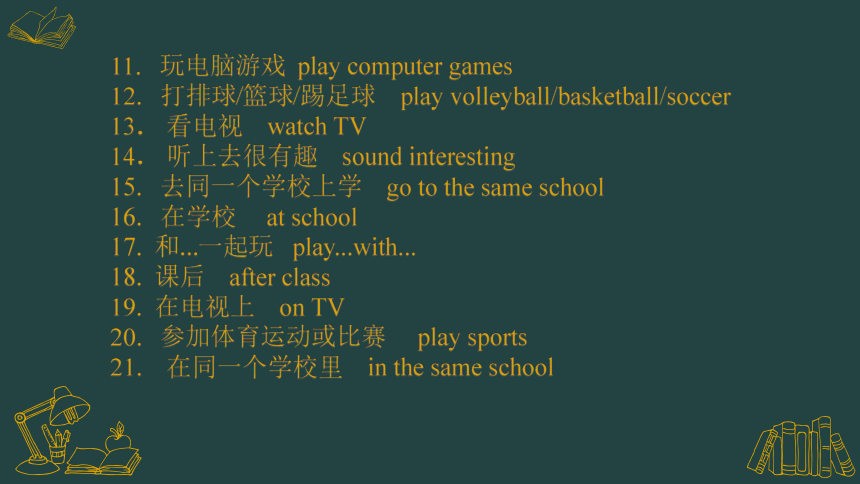
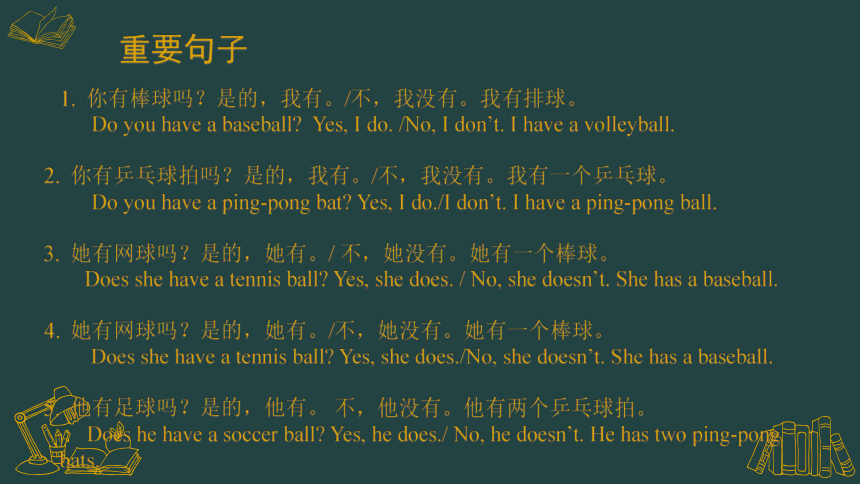
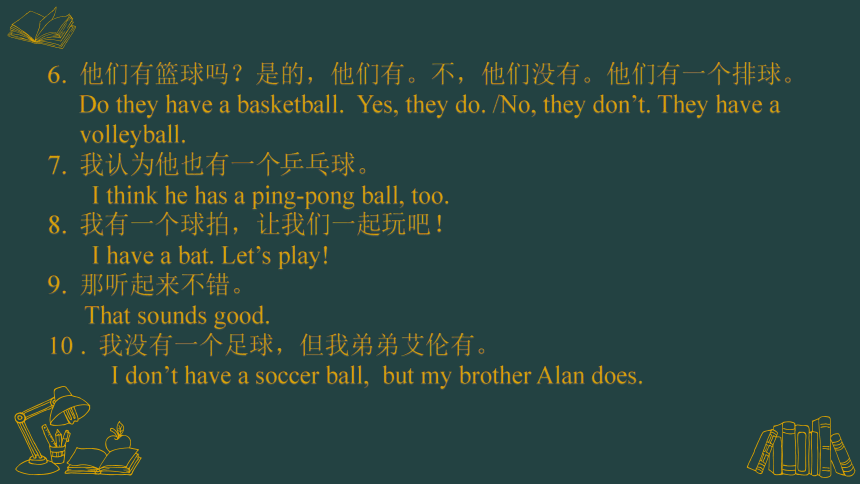
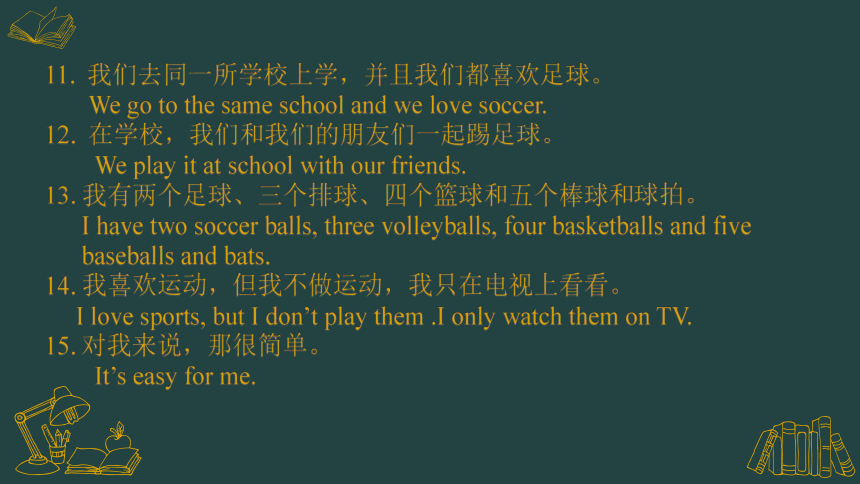



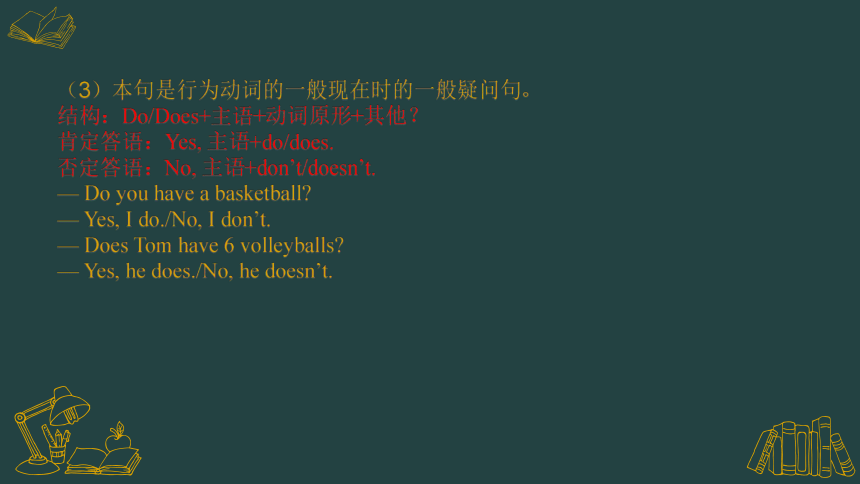
文档简介
(共32张PPT)
七年级上 Unit 5 Do you have a soccer ball
人教版
目录
基础知识
重难点分析
语法聚焦
习题巩固
基础知识
Lorem ipsum dolor sit amet, consectetur adipisicing elit.
01
必备短语
1. 乒乓球拍 ping-pong bat
2. 乒乓球 ping-pong ball
3. 网球 tennis ball
4. 足球 soccer ball
5. 棒球拍 baseball bat
6. 让我们(一起) let’s/ let us
7. 听起来不错 sound good
8. 迟的 be late
9. 在我的包里 in my bag
10. 我们走吧 Let’s go
11. 玩电脑游戏 play computer games
12. 打排球/篮球/踢足球 play volleyball/basketball/soccer
13. 看电视 watch TV
14. 听上去很有趣 sound interesting
15. 去同一个学校上学 go to the same school
16. 在学校 at school
17. 和...一起玩 play...with...
18. 课后 after class
19. 在电视上 on TV
20. 参加体育运动或比赛 play sports
21. 在同一个学校里 in the same school
重要句子
1. 你有棒球吗?是的,我有。/不,我没有。我有排球。
Do you have a baseball Yes, I do. /No, I don’t. I have a volleyball.
2. 你有乒乓球拍吗?是的,我有。/不,我没有。我有一个乒乓球。
Do you have a ping-pong bat Yes, I do./I don’t. I have a ping-pong ball.
3. 她有网球吗?是的,她有。/ 不,她没有。她有一个棒球。
Does she have a tennis ball Yes, she does. / No, she doesn’t. She has a baseball.
4. 她有网球吗?是的,她有。/不,她没有。她有一个棒球。
Does she have a tennis ball Yes, she does./No, she doesn’t. She has a baseball.
5. 他有足球吗?是的,他有。 不,他没有。他有两个乒乓球拍。
Does he have a soccer ball Yes, he does./ No, he doesn’t. He has two ping-pong bats.
6. 他们有篮球吗?是的,他们有。不,他们没有。他们有一个排球。
Do they have a basketball. Yes, they do. /No, they don’t. They have a
volleyball.
7. 我认为他也有一个乒乓球。
I think he has a ping-pong ball, too.
8. 我有一个球拍,让我们一起玩吧!
I have a bat. Let’s play!
9. 那听起来不错。
That sounds good.
10 . 我没有一个足球,但我弟弟艾伦有。
I don’t have a soccer ball, but my brother Alan does.
11. 我们去同一所学校上学,并且我们都喜欢足球。
We go to the same school and we love soccer.
12. 在学校,我们和我们的朋友们一起踢足球。
We play it at school with our friends.
13. 我有两个足球、三个排球、四个篮球和五个棒球和球拍。
I have two soccer balls, three volleyballs, four basketballs and five
baseballs and bats.
14. 我喜欢运动,但我不做运动,我只在电视上看看。
I love sports, but I don’t play them .I only watch them on TV.
15. 对我来说,那很简单。
It’s easy for me.
16. 课后,我和同学打乒乓球。
After class, I play ping-pong with my classmates.
17. 我弟弟和我在同一个学校。
My brother and I are in the same school.
18. 我没有棒球,但我又一个足球。
I don’t have a baseball, but I have a soccer ball.
19. 足球(运动)是很难的。
Soccer is difficult.
20. 这个故事很有趣。
The story is very interesting.
21. 我对这个故事感兴趣。
I am interested in the story.
重难点分析
Lorem ipsum dolor sit amet, consectetur adipisicing elit.
02
1. Do you have a ping-pong bat
(1)do aux v. & v.
1)做实义动词时,意为“做;干”。
I often do some housework for my parents.
2) 做助动词时,用于构成否定句和疑问句,没有实际意义。
She doesn’t like apples.
Does the woman work here
(2) have v. 第三人称单数—has。
1)“有”,侧重于所属关系
He has four footballs.
2) “吃,喝”
I have an egg and a glass of milk for breakfast.
3) “上……课”
Lucy has P.E. class on Tuesday.
4) “进行;举行”
Let’s have a birthday party for our mother.
(3)本句是行为动词的一般现在时的一般疑问句。
结构:Do/Does+主语+动词原形+其他?
肯定答语:Yes, 主语+do/does.
否定答语:No, 主语+don’t/doesn’t.
— Do you have a basketball
— Yes, I do./No, I don’t.
— Does Tom have 6 volleyballs
— Yes, he does./No, he doesn’t.
2. Let’s go.
(1)该句是let结构的祈使句。
该句的结构:Let’s+动词原形+其他!意为“我们做某事吧!”
其否定形式是Let’s not do sth.。
Let’s go skiing.
Let’s not go out.
(3)let’s & let us
词条 意义 例句
let’s “我们一起……”,包括说话者与听话者双方在内。 Let’s go and play basketball.
let us “(你)让我们……”,不包括听话者在内。 Mom, my brother and I are free. Let us watch some cartoons.
(3)go v. 去;走
1)go后接地点名词时,必须加介词to;若接地点副词there, here, home等时,则不加介词to。
She goes to school at 8:00 o’clock.
He goes home at six in the afternoon.
2)go +v.-ing 去做……
go swimming 去游泳 go fishing 去钓鱼
3. That sounds good.
本句是主系表的结构,其中sound是感官动词,意为“听起来”,其后的good是形容词,在该句中作表语。
常见感官动词:smell 闻起来 look 看起来 taste 尝起来 feel 摸起来
例句:
The cake smells good.
He looks unhappy.
It feels very soft.
The food in this restaurant tastes good.
4. We play it at school with our friends.
1)play…with… 和……一起玩……
I often play basketball with my friends after school.
2)play v. 参加(比赛或运动);玩耍
play后接球类、棋类名词时,名词前不加the;play后接西方乐器名词时,名词前加the。
Let’s play basketball after school.
She plays the violin every day.
2)with作为介词,意为“和……一起;带有,具有;随身带着;用”。
China is a country with a long history.
I want to go to Beijing with my parents.
She does her homework with a pen.
5. It’s easy for me.
1)It’s adj. for sb. to do sth. 意为“对某人来说做某事……”
It’s easy for me to study English.
2)for作为介词,常见用法如下:
a.对……来说
The problem is easy for me.
b.为了
What can I do for you
c.因为,由于
Thank you for helping me.
6.My brother and I are in the same school.
(1) same adj. 相同的
1)same作形容词时,通常和the连用。
They are in the same class.
2)the same…as… 和……一样……
These basketballs are the same as mine.
3)look the same 看起来一样
The twins look the same.
4)all the same 尽管如此;仍然
Thank you all the same.
(2)人称的排序特点:
(1)单数排列顺序是“第二人称,第三人称,第一人称”.
You, he and I have the same T-shirt.
(2)复数排列顺序是“第一人称,第二人称,第三人称”.
We, you and they like watching TV at home.
(3)当第三人称为两性并列时,一般是男先女后。
He and she are late for work.
7.The story is very interesting. 这个故事很有趣。
(1) interesting adj. 有趣的
1)interesting & interested
interesting 以-ing结尾的形容词,表示“令人感兴趣的”,常用来修饰事或物。
interested 以-ed结尾的形容词,表示“感兴趣的”,常用来修饰人。
2)be /become/get interested in… “对……感兴趣”
This movie is very interesting.
I’m interested in it very much.
3)以-ing,-ed结尾的形容词还有:
以-ing结尾的 以-ed结尾的
boring 令人无聊的 bored 感到无聊的
relaxing 令人放松的 relaxing 感到放松的
exciting 令人兴奋的 excited 感到兴奋的
surprising 令人惊讶的 surprised 感到惊讶的
8.After class, I play ping-pong with my classmates. 课后,我和同学打乒乓球。
class n. 班级;课
1)作为集合名词,视为整体,谓语动词用单数;视为个体成员时,谓语动词用复数。
Class 5 is the best class in Grade 7.
The class are singing a English song .
2)class & lesson
词条 意义 例句
class 指课程表上的“课”,或在教室里上的课 We don’t have Chinese class Tuesday.
lesson 指课本中的一课、课时、功课 He often helps me with my lessons.
9. I love sports, but I don’t play them . I only watch them on TV.
我喜欢运动,但我不做运动,我只在电视上看看。
(1)watch v. 注视;观看
1)watch 实义动词,意为“注视;观看“。第三人称单数watches。
The boy watches TV every day.
2)watch名词,意为”手表“,其复数形式是watches。
She has a nice watch.
My brother has two watches.
3)look, see, watch, read
词条 用法 示例
look 意为“看“,强调”看“的动作。单独使用时,用来引起对方的注意;如果后跟宾语,要和at连用。 Look! Mr. White is coming.Look at the blackboard, please.
see 强调“看“的结果,意为”看见,看到“。 I see a bird in the tree.
watch 强调“专注地看“,有欣赏的意味,常用于看电视、看球赛等。 She watches TV.
read 意为“阅读“,指看有文字内容的东西。 He likes reading books.
(2)love & like
love与like同义,但love表示带有强烈感情,like为普通用词。
1)like/love doing sth. 喜欢做某事(习惯性的动作或爱好,强调一种状态)
She likes reading stories on weekends.
2)like/love to do sth. 喜欢做某事(具体的一次动作,强调一时的行为)
He likes to play basketball this afternoon.
语法聚焦
Lorem ipsum dolor sit amet, consectetur adipisicing elit.
03
专项突破—行为动词的一般现在时
1.行为动词的一般现在时的用法
用于描述经常发生的动作,通常和every day, usually, often等词或短语搭配。
She gets up early every day.
2. 行为动词的第三人称单数形式
当主语是第三人称单数形式时,行为动词要用第三人称单数形式,它的变化规律和名词变复数类似。具体如下:
规律 例词
一般情况下,直接在动词词尾加-s get →gets take →takes
以s, sh, ch, x, o结尾的动词,在词尾加-es teach →teaches go →goes watch →watches
以辅音字母加y结尾的动词,变y为i,再加-es study →studies try →tries
其他 have →has
3.行为动词的一般现在时的句式变化
1)肯定句基本句式
have动词:主语(非第三人称单数)+have+其他.主语(第三人称单数)+has+其他. They have some new books.He has a new watch.
行为动词:主语(非第三人称单数)+行为动词原形+其他.主语(第三人称单数)+第三人称单数动词+其他. They like playing basketball.He likes watching TV.
2) 否定句基本句式
have动词:主语(非第三人称单数)+don’t have+其他.主语(第三人称单数)+doesn’t have+其他. I don’t have a baseball.She doesn’t have a new pen.
行为动词:主语(非第三人称单数)+don’t+行为动词原形+其他.主语(第三人称单数)+doesn’t+行为动词原形+其他. They don’t go to school on Sundays.She doesn’t eat apples.
3) 一般疑问句式及答语
have动词:Do+主语(非第三人称单数)+have+其他?Does+主语(第三人称单数)+have+其他?答语:Yes, 主语+do/does. No, 主语+don’t/doesn’t. — Does she have a sister — No, she doesn’t.
行为动词:Do+主语(非第三人称单数)+行为动词原形+其他?Does+主语(第三人称单数)+行为动词原形+其他?答语:Yes, 主语+do/does. No, 主语+don’t/doesn’t. — Do they like watching TV — Yes, they do.
1.Wang Ping a hat. What about you
A. doesn’t has B. doesn’t have C. don’t have
2. He often his homework on Sundays.
A. do B. don’t C. does
3. — Do you have a basketball
— .
A. Yes, I do. B. Yes, I have. C. Yes, I has.
4. He always lunch at school.
A. eat B. have C. has
5. John often sports on TV.
A. watches B. watch C. watching
习题巩固
Lorem ipsum dolor sit amet, consectetur adipisicing elit.
04
1. Tina ______ to school at seven o’clock every day.
A.go B. goes C. are going D. are
2. ______ have a look _____ the photo.
A. Let; on B. Let; at C. Let’s; at D. Let’s; on
3. -______ your father _______ a new car
-Yes, he does.
A. Do; has B. Do; have C. Does; have D. Does; has
4. I like baseball. ________ you
A. Do B. What do C. What about D. How do
5. -Does Jane have a baseball
-No, ______.
A. he does B. he doesn’t C. she does D. she doesn’t
6. Every boy in our class _______ a basketball.
A. is B. have C. has D. are
7. Do you have______ volleyball Let’s play_____ volleyball.
A. a; a B. / ; / C. a; / D. / ; a
8. Does your brother _______ a baseball
A. has B. have C. is D. are
9. -What’s ____ TV tonight
-Sorry, I don’t know.
A. on B. to C. in D. at
10. I have a sister. My parents like _______.
A. me B. them C. us D. we
11. Can you ______ a book on the table Please give it to me.
A. look B. see C. read D. watch
12. Listen! Her voice ______ very good.
A. listen B. listens C. sound D. sounds
13. The question isn’t difficult, _______ he can’t answer it.
A. and B. but C. so D. or
14. My mother ______sports, she only ______ them on TV.
A. doesn’t play; watches B. not play; watches
C. don’t play; watch D. doesn’t play; watch
15. The question is not easy. It’s very _______ .
A. interesting B. fun C. difficult D. relaxing
七年级上 Unit 5 Do you have a soccer ball
人教版
目录
基础知识
重难点分析
语法聚焦
习题巩固
基础知识
Lorem ipsum dolor sit amet, consectetur adipisicing elit.
01
必备短语
1. 乒乓球拍 ping-pong bat
2. 乒乓球 ping-pong ball
3. 网球 tennis ball
4. 足球 soccer ball
5. 棒球拍 baseball bat
6. 让我们(一起) let’s/ let us
7. 听起来不错 sound good
8. 迟的 be late
9. 在我的包里 in my bag
10. 我们走吧 Let’s go
11. 玩电脑游戏 play computer games
12. 打排球/篮球/踢足球 play volleyball/basketball/soccer
13. 看电视 watch TV
14. 听上去很有趣 sound interesting
15. 去同一个学校上学 go to the same school
16. 在学校 at school
17. 和...一起玩 play...with...
18. 课后 after class
19. 在电视上 on TV
20. 参加体育运动或比赛 play sports
21. 在同一个学校里 in the same school
重要句子
1. 你有棒球吗?是的,我有。/不,我没有。我有排球。
Do you have a baseball Yes, I do. /No, I don’t. I have a volleyball.
2. 你有乒乓球拍吗?是的,我有。/不,我没有。我有一个乒乓球。
Do you have a ping-pong bat Yes, I do./I don’t. I have a ping-pong ball.
3. 她有网球吗?是的,她有。/ 不,她没有。她有一个棒球。
Does she have a tennis ball Yes, she does. / No, she doesn’t. She has a baseball.
4. 她有网球吗?是的,她有。/不,她没有。她有一个棒球。
Does she have a tennis ball Yes, she does./No, she doesn’t. She has a baseball.
5. 他有足球吗?是的,他有。 不,他没有。他有两个乒乓球拍。
Does he have a soccer ball Yes, he does./ No, he doesn’t. He has two ping-pong bats.
6. 他们有篮球吗?是的,他们有。不,他们没有。他们有一个排球。
Do they have a basketball. Yes, they do. /No, they don’t. They have a
volleyball.
7. 我认为他也有一个乒乓球。
I think he has a ping-pong ball, too.
8. 我有一个球拍,让我们一起玩吧!
I have a bat. Let’s play!
9. 那听起来不错。
That sounds good.
10 . 我没有一个足球,但我弟弟艾伦有。
I don’t have a soccer ball, but my brother Alan does.
11. 我们去同一所学校上学,并且我们都喜欢足球。
We go to the same school and we love soccer.
12. 在学校,我们和我们的朋友们一起踢足球。
We play it at school with our friends.
13. 我有两个足球、三个排球、四个篮球和五个棒球和球拍。
I have two soccer balls, three volleyballs, four basketballs and five
baseballs and bats.
14. 我喜欢运动,但我不做运动,我只在电视上看看。
I love sports, but I don’t play them .I only watch them on TV.
15. 对我来说,那很简单。
It’s easy for me.
16. 课后,我和同学打乒乓球。
After class, I play ping-pong with my classmates.
17. 我弟弟和我在同一个学校。
My brother and I are in the same school.
18. 我没有棒球,但我又一个足球。
I don’t have a baseball, but I have a soccer ball.
19. 足球(运动)是很难的。
Soccer is difficult.
20. 这个故事很有趣。
The story is very interesting.
21. 我对这个故事感兴趣。
I am interested in the story.
重难点分析
Lorem ipsum dolor sit amet, consectetur adipisicing elit.
02
1. Do you have a ping-pong bat
(1)do aux v. & v.
1)做实义动词时,意为“做;干”。
I often do some housework for my parents.
2) 做助动词时,用于构成否定句和疑问句,没有实际意义。
She doesn’t like apples.
Does the woman work here
(2) have v. 第三人称单数—has。
1)“有”,侧重于所属关系
He has four footballs.
2) “吃,喝”
I have an egg and a glass of milk for breakfast.
3) “上……课”
Lucy has P.E. class on Tuesday.
4) “进行;举行”
Let’s have a birthday party for our mother.
(3)本句是行为动词的一般现在时的一般疑问句。
结构:Do/Does+主语+动词原形+其他?
肯定答语:Yes, 主语+do/does.
否定答语:No, 主语+don’t/doesn’t.
— Do you have a basketball
— Yes, I do./No, I don’t.
— Does Tom have 6 volleyballs
— Yes, he does./No, he doesn’t.
2. Let’s go.
(1)该句是let结构的祈使句。
该句的结构:Let’s+动词原形+其他!意为“我们做某事吧!”
其否定形式是Let’s not do sth.。
Let’s go skiing.
Let’s not go out.
(3)let’s & let us
词条 意义 例句
let’s “我们一起……”,包括说话者与听话者双方在内。 Let’s go and play basketball.
let us “(你)让我们……”,不包括听话者在内。 Mom, my brother and I are free. Let us watch some cartoons.
(3)go v. 去;走
1)go后接地点名词时,必须加介词to;若接地点副词there, here, home等时,则不加介词to。
She goes to school at 8:00 o’clock.
He goes home at six in the afternoon.
2)go +v.-ing 去做……
go swimming 去游泳 go fishing 去钓鱼
3. That sounds good.
本句是主系表的结构,其中sound是感官动词,意为“听起来”,其后的good是形容词,在该句中作表语。
常见感官动词:smell 闻起来 look 看起来 taste 尝起来 feel 摸起来
例句:
The cake smells good.
He looks unhappy.
It feels very soft.
The food in this restaurant tastes good.
4. We play it at school with our friends.
1)play…with… 和……一起玩……
I often play basketball with my friends after school.
2)play v. 参加(比赛或运动);玩耍
play后接球类、棋类名词时,名词前不加the;play后接西方乐器名词时,名词前加the。
Let’s play basketball after school.
She plays the violin every day.
2)with作为介词,意为“和……一起;带有,具有;随身带着;用”。
China is a country with a long history.
I want to go to Beijing with my parents.
She does her homework with a pen.
5. It’s easy for me.
1)It’s adj. for sb. to do sth. 意为“对某人来说做某事……”
It’s easy for me to study English.
2)for作为介词,常见用法如下:
a.对……来说
The problem is easy for me.
b.为了
What can I do for you
c.因为,由于
Thank you for helping me.
6.My brother and I are in the same school.
(1) same adj. 相同的
1)same作形容词时,通常和the连用。
They are in the same class.
2)the same…as… 和……一样……
These basketballs are the same as mine.
3)look the same 看起来一样
The twins look the same.
4)all the same 尽管如此;仍然
Thank you all the same.
(2)人称的排序特点:
(1)单数排列顺序是“第二人称,第三人称,第一人称”.
You, he and I have the same T-shirt.
(2)复数排列顺序是“第一人称,第二人称,第三人称”.
We, you and they like watching TV at home.
(3)当第三人称为两性并列时,一般是男先女后。
He and she are late for work.
7.The story is very interesting. 这个故事很有趣。
(1) interesting adj. 有趣的
1)interesting & interested
interesting 以-ing结尾的形容词,表示“令人感兴趣的”,常用来修饰事或物。
interested 以-ed结尾的形容词,表示“感兴趣的”,常用来修饰人。
2)be /become/get interested in… “对……感兴趣”
This movie is very interesting.
I’m interested in it very much.
3)以-ing,-ed结尾的形容词还有:
以-ing结尾的 以-ed结尾的
boring 令人无聊的 bored 感到无聊的
relaxing 令人放松的 relaxing 感到放松的
exciting 令人兴奋的 excited 感到兴奋的
surprising 令人惊讶的 surprised 感到惊讶的
8.After class, I play ping-pong with my classmates. 课后,我和同学打乒乓球。
class n. 班级;课
1)作为集合名词,视为整体,谓语动词用单数;视为个体成员时,谓语动词用复数。
Class 5 is the best class in Grade 7.
The class are singing a English song .
2)class & lesson
词条 意义 例句
class 指课程表上的“课”,或在教室里上的课 We don’t have Chinese class Tuesday.
lesson 指课本中的一课、课时、功课 He often helps me with my lessons.
9. I love sports, but I don’t play them . I only watch them on TV.
我喜欢运动,但我不做运动,我只在电视上看看。
(1)watch v. 注视;观看
1)watch 实义动词,意为“注视;观看“。第三人称单数watches。
The boy watches TV every day.
2)watch名词,意为”手表“,其复数形式是watches。
She has a nice watch.
My brother has two watches.
3)look, see, watch, read
词条 用法 示例
look 意为“看“,强调”看“的动作。单独使用时,用来引起对方的注意;如果后跟宾语,要和at连用。 Look! Mr. White is coming.Look at the blackboard, please.
see 强调“看“的结果,意为”看见,看到“。 I see a bird in the tree.
watch 强调“专注地看“,有欣赏的意味,常用于看电视、看球赛等。 She watches TV.
read 意为“阅读“,指看有文字内容的东西。 He likes reading books.
(2)love & like
love与like同义,但love表示带有强烈感情,like为普通用词。
1)like/love doing sth. 喜欢做某事(习惯性的动作或爱好,强调一种状态)
She likes reading stories on weekends.
2)like/love to do sth. 喜欢做某事(具体的一次动作,强调一时的行为)
He likes to play basketball this afternoon.
语法聚焦
Lorem ipsum dolor sit amet, consectetur adipisicing elit.
03
专项突破—行为动词的一般现在时
1.行为动词的一般现在时的用法
用于描述经常发生的动作,通常和every day, usually, often等词或短语搭配。
She gets up early every day.
2. 行为动词的第三人称单数形式
当主语是第三人称单数形式时,行为动词要用第三人称单数形式,它的变化规律和名词变复数类似。具体如下:
规律 例词
一般情况下,直接在动词词尾加-s get →gets take →takes
以s, sh, ch, x, o结尾的动词,在词尾加-es teach →teaches go →goes watch →watches
以辅音字母加y结尾的动词,变y为i,再加-es study →studies try →tries
其他 have →has
3.行为动词的一般现在时的句式变化
1)肯定句基本句式
have动词:主语(非第三人称单数)+have+其他.主语(第三人称单数)+has+其他. They have some new books.He has a new watch.
行为动词:主语(非第三人称单数)+行为动词原形+其他.主语(第三人称单数)+第三人称单数动词+其他. They like playing basketball.He likes watching TV.
2) 否定句基本句式
have动词:主语(非第三人称单数)+don’t have+其他.主语(第三人称单数)+doesn’t have+其他. I don’t have a baseball.She doesn’t have a new pen.
行为动词:主语(非第三人称单数)+don’t+行为动词原形+其他.主语(第三人称单数)+doesn’t+行为动词原形+其他. They don’t go to school on Sundays.She doesn’t eat apples.
3) 一般疑问句式及答语
have动词:Do+主语(非第三人称单数)+have+其他?Does+主语(第三人称单数)+have+其他?答语:Yes, 主语+do/does. No, 主语+don’t/doesn’t. — Does she have a sister — No, she doesn’t.
行为动词:Do+主语(非第三人称单数)+行为动词原形+其他?Does+主语(第三人称单数)+行为动词原形+其他?答语:Yes, 主语+do/does. No, 主语+don’t/doesn’t. — Do they like watching TV — Yes, they do.
1.Wang Ping a hat. What about you
A. doesn’t has B. doesn’t have C. don’t have
2. He often his homework on Sundays.
A. do B. don’t C. does
3. — Do you have a basketball
— .
A. Yes, I do. B. Yes, I have. C. Yes, I has.
4. He always lunch at school.
A. eat B. have C. has
5. John often sports on TV.
A. watches B. watch C. watching
习题巩固
Lorem ipsum dolor sit amet, consectetur adipisicing elit.
04
1. Tina ______ to school at seven o’clock every day.
A.go B. goes C. are going D. are
2. ______ have a look _____ the photo.
A. Let; on B. Let; at C. Let’s; at D. Let’s; on
3. -______ your father _______ a new car
-Yes, he does.
A. Do; has B. Do; have C. Does; have D. Does; has
4. I like baseball. ________ you
A. Do B. What do C. What about D. How do
5. -Does Jane have a baseball
-No, ______.
A. he does B. he doesn’t C. she does D. she doesn’t
6. Every boy in our class _______ a basketball.
A. is B. have C. has D. are
7. Do you have______ volleyball Let’s play_____ volleyball.
A. a; a B. / ; / C. a; / D. / ; a
8. Does your brother _______ a baseball
A. has B. have C. is D. are
9. -What’s ____ TV tonight
-Sorry, I don’t know.
A. on B. to C. in D. at
10. I have a sister. My parents like _______.
A. me B. them C. us D. we
11. Can you ______ a book on the table Please give it to me.
A. look B. see C. read D. watch
12. Listen! Her voice ______ very good.
A. listen B. listens C. sound D. sounds
13. The question isn’t difficult, _______ he can’t answer it.
A. and B. but C. so D. or
14. My mother ______sports, she only ______ them on TV.
A. doesn’t play; watches B. not play; watches
C. don’t play; watch D. doesn’t play; watch
15. The question is not easy. It’s very _______ .
A. interesting B. fun C. difficult D. relaxing
同课章节目录
- starters 预备篇(2012秋审查)
- Unit 1 Good morning !
- Unit 2 What’s this in English?
- Unit 3 What color is it ?
- Unit 1 My name's Gina.
- Section A
- Section B
- Unit 2 This is my sister.
- Section A
- Section B
- Unit 3 Is this your pencil?
- Section A
- Section B
- Unit 4 Where's my schoolbag?
- Section A
- Section B
- Unit 5 Do you have a soccer ball?
- Section A
- Section B
- Unit 6 Do you like bananas?
- Section A
- Section B
- Unit 7 How much are these socks?
- Section A
- Section B
- Unit 8 When is your birthday?
- Section A
- Section B
- Unit 9 My favorite subject is science.
- Section A
- Section B
